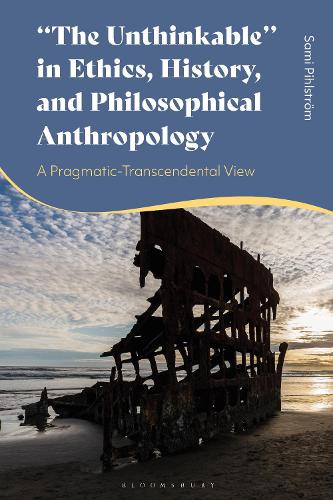
"The Unthinkable" in Ethics, History and Philosophical Anthropology: A Pragmatic-Transcendental View
(Hardback)
Publishing Details
"The Unthinkable" in Ethics, History and Philosophical Anthropology: A Pragmatic-Transcendental View
By (Author) Professor Sami Pihlstrm
Bloomsbury Publishing PLC
Bloomsbury Academic
6th February 2025
United Kingdom
Classifications
Professional and Scholarly
Non Fiction
Pragmatism
170.9
Physical Properties
Hardback
232
Width 155mm, Height 234mm, Spine 18mm
540g
Description
What we find unthinkable is not seriously considered as an ethical option in our thought and deliberation; it is ruled out from the outset. Combining a broadly pragmatist approach with a Kantian-inspired transcendental strategy, Sami Pihlstrm distinguishes between what is considered unthinkable and what is merely ethically wrong. Pihlstrm demonstrates how different issues concerning the unthinkable vs the thinkable, ranging from the proper ethical response to the Holocaust to philosophical considerations of monstrous characters familiar in gothic fiction, may challenge the categories we use to structure the world. In particular, he makes the case that it is unthinkable for us to reject the kind of human exceptionalism that attributes an ineliminable dignity or preciousness to human beings. Chapters also explore the complex relationship between our responses to human suffering and the suffering of non-human animals, together with questions concerning the philosophy of war and pacifism. The Unthinkable in Ethics, History and Philosophical Anthropology turns our attention to the ethically and ontologically constitutive character of the boundaries we draw between the thinkable and the unthinkable, while utilizing conceptual and argumentative resources from the Wittgensteinian tradition in moral philosophy, particularly from the work of Raimond Gaita. An original and timely study, it will be welcomed by students and scholars interested in the fundamental ethical issues of human life.
Reviews
A profound insight into the conditions underlying the debate about the 'ethically unthinkable' by one of the most distinctive representatives of contemporary pragmatism. Pihlstrom leads us to understand the relevance of ethics, philosophy, religion, history, anthropology, culture, and politics in our present context. -- Krzysztof (Chris) Piotr Skowronski, Associate Professor, University of Opole, Poland
Long ago, in his groundbreaking work, Good and Evil, Australian philosopher Raimond Gaita, summarising Socrates, wrote: for someone who understands the nature of evil, certain deeds and thoughts are not an option. Following Gaita, though not slavishly but critically, Professor Pihlstrm gives this Socratic insight his own unique transcendental-pragmatist inflection before applying it to a range of cases involving our relations with the suffering other. The result is a rich and illuminating defence of the unthinkable as the very condition of possibility of an ethical life grounded in the commitment to our common humanity -- Nick Trakakis, Senior Lecturer in Philosophy, Australian Catholic University, Australia
The Unthinkable in Ethics, History and Philosophical Anthropology is a perfect example of Sami Pihlstrms original combination of pragmatism and transcendental philosophy to address new and relevant problems. In it, Pihlstrm argues that the distinction between what is ethically wrong and what is unthinkable helps us defining the boundaries and conditions of our moral discourse. -- Gabriele Gava, Associate Professor, University of Turin, Italy
Author Bio
Sami Pihlstrm is Professor of Philosophy of Religion at the University of Helsinki, Finland.
